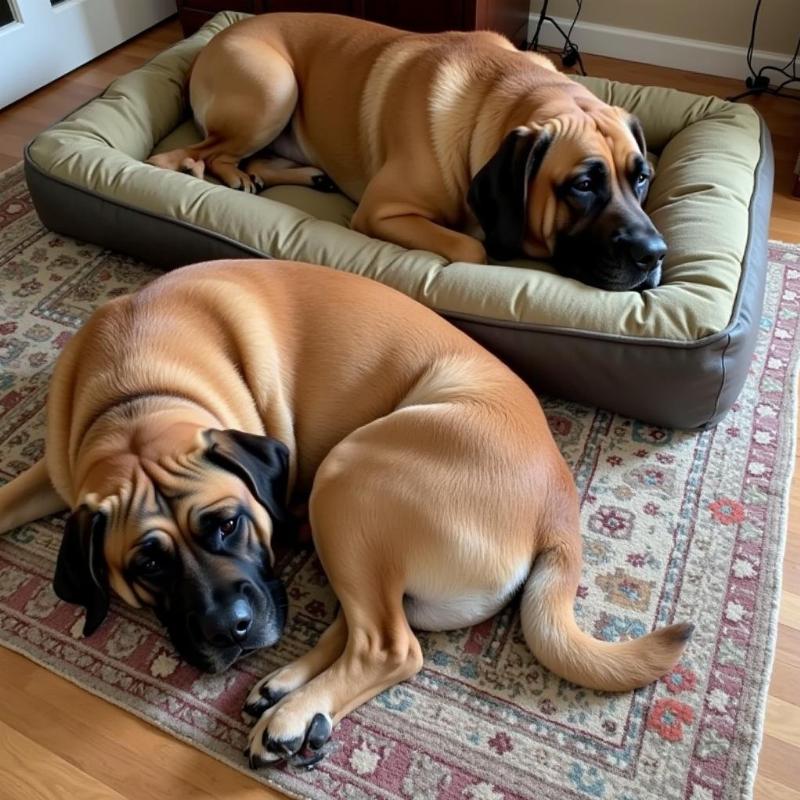Getting enough sleep is crucial for a dog’s health and well-being, just like it is for humans. But have you ever wondered which dog breeds are champion sleepers? Understanding your dog’s sleep patterns can help you ensure they’re getting the rest they need to thrive. Let’s delve into the world of canine slumber and discover “what dogs sleep the most.”
Sleepyheads of the Canine World: Exploring Dog Breeds That Love to Snooze
While all dogs need sleep, some breeds are known for their impressive ability to catch some Z’s. Giant breeds, such as Great Danes, Mastiffs, and Saint Bernards, often top the list of sleepy dogs, sometimes clocking in up to 14-18 hours a day. Their large size and slower metabolisms contribute to their increased need for rest.
 Large dogs sleeping a lot
Large dogs sleeping a lot
Senior dogs, regardless of breed, also require more sleep than their younger counterparts. Just like older humans, senior dogs experience changes in their sleep cycles and may need more rest to maintain their health and energy levels. Providing them with a comfortable and supportive bed can help ensure they get the quality sleep they need.
Factors Affecting a Dog’s Sleep Patterns
Beyond breed and age, several other factors can influence a dog’s sleep needs. Activity level plays a significant role; a dog that spends the day hiking or playing fetch will likely sleep more soundly and for longer periods than a dog with a more sedentary lifestyle. Stress and anxiety can also disrupt a dog’s sleep, highlighting the importance of creating a calm and secure environment for your furry friend.
How Much Sleep is Enough? Understanding Your Dog’s Needs
While knowing which breeds generally sleep the most is helpful, it’s important to remember that each dog is an individual. Monitoring your dog’s behavior and energy levels can help you determine if they are getting enough rest. A well-rested dog will be alert, playful, and engaged with their surroundings. If you notice changes in your dog’s sleep patterns or behavior, consult with your veterinarian to rule out any underlying medical conditions.
Creating a Sleep Sanctuary for Your Canine Companion
Providing your dog with a comfortable and safe sleeping environment can promote healthy sleep habits. Invest in a supportive dog bed that caters to your dog’s size and sleeping style. drool bibs for large dogs can be helpful for messy sleepers. Maintaining a consistent sleep schedule and creating a quiet and dimly lit space can also help your dog relax and get the restful sleep they need.
Conclusion: Prioritizing Rest for a Happy and Healthy Dog
Understanding your dog’s sleep needs is an essential part of responsible pet ownership. While some breeds, like Great Danes and Mastiffs, are known for their love of sleep, factors such as age, activity level, and overall health also play a role. By paying attention to your dog’s individual needs and creating a supportive sleep environment, you can ensure they get the rest they need to live a long, healthy, and happy life. Remember, a well-rested dog is a happy dog!
FAQ:
- Do puppies sleep more than adult dogs? Yes, puppies require significantly more sleep than adult dogs, often sleeping up to 18-20 hours a day.
- Why is my dog sleeping more than usual? Several factors can contribute to increased sleep, including age, breed, activity level, and even the weather. If you’re concerned, consult your veterinarian.
- How can I help my dog sleep better? Establish a consistent sleep schedule, provide a comfortable bed, and create a quiet and relaxing sleep environment.
- Is it normal for dogs to dream? Yes, dogs experience REM sleep, the stage of sleep associated with dreaming.
- What are the signs of sleep deprivation in dogs? Signs of sleep deprivation can include increased anxiety, irritability, changes in appetite, and difficulty concentrating.
- Can I give my dog melatonin to help them sleep? Consult with your veterinarian before giving your dog any supplements, including melatonin.
- Why does my dog sleep so much during the day? Dogs are naturally crepuscular, meaning they are most active during dawn and dusk. They may sleep more during the day and night.
Related Articles:
Beautdogs.us is your premier source for all things dog-related in the US. We offer expert advice on dog breeds, care, and lifestyle, providing a wealth of information for both new and experienced dog owners. Whether you’re looking for breed-specific guidance or tips on creating a comfortable and enriching environment for your canine companion, Beautdogs.us is here to help. Contact us today at [email protected] or +1 501-555-7529 to learn more about how we can support you and your furry friend!